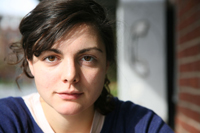Lacanian Psychoanalysis and Mother-Child Relationships

By Taliesin Nyala 07F
Most striking about Division III student Melanie Parker 05F is her conscientiousness when describing her writing approach to questions of what is natural and what is horrific in mother-child relationships.
 |
Instead of treating such ideas as too appalling to engage, Parker decided to apply Lacanian psychoanalysis to stories of infanticide. Even though people generally consider reproduction to be "natural," Parker explains, psychoanalyst Jacques Lacan believed that, in humans, nature is overwritten by language.
"And if we are not natural in our being, then what does it mean to be a mother? What is mother love?" asks Parker.
Lacanian psychoanalysis contends that humans are constructed by language. Lacan's work is a reinterpretation of Freud's, and his main point is that humans, from the time of birth, experience an unconscious split that "seeps into our lives, through our discourse and bodily experience," and we have to find ways to live with it, Parker says.
Her Div III incorporates an analytical paper and a collection of fiction stories on Lacanian psychoanalysis and mother-child relationships, with an undercurrent of fear and desire woven throughout.
"A lot of what I was trying to work out in the paper I ended up putting in fiction," she says. "Sometimes the only way I can think about hard, theoretical questions is through fiction."
Parker came to Hampshire knowing she wanted to write, and spent her time taking a variety of courses on different subjects of interest. "I wanted to mine a wide array of sources," she says. In fall 2007, she did a field study in Argentina, where she began reading various works through psychoanalytic lenses.
Though she did not set out to write about mothers and children, she says she was drawn to the material without realizing it. Regarding infanticide, she realizes that it is shocking, yet believes it is important to think about.
"I came to Hampshire because I was interested in the freedom I could have to combine different interests," she remarks. "I'm taking away a philosophy of living, an idea of how I want to be in the world, and this reinforced idea that I could actually write. Hampshire has shown me that I could do that."
Division III faculty committee: Annie Rogers, professor of clinical psychology, and Ellie Siegel, co-director of the writing program.
Article Tags

